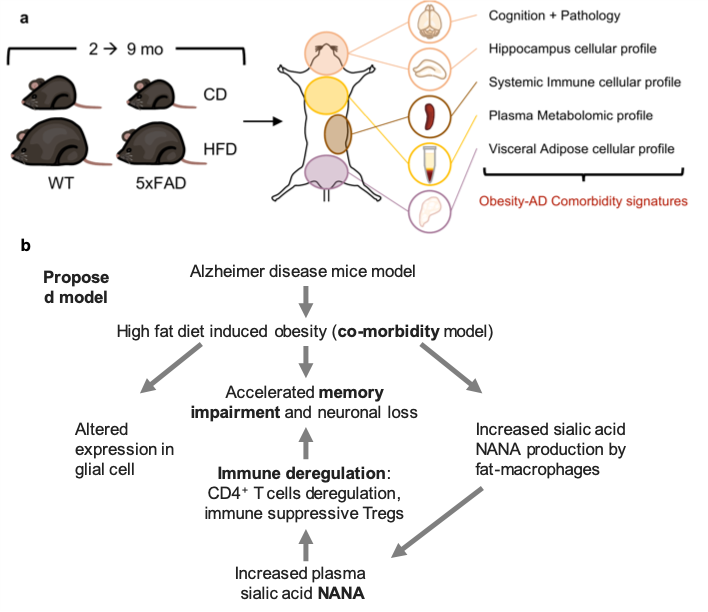Obesity is known to increase the risk for Alzheimer’s disease (AD), but little is known about the biological mechanism that drives this phenomenon. In this study, an international team of researchers from the Schwartz lab, Habib lab, and Greka lab, investigated the connection between obesity and AD in a mouse model that combines the two disorders. We found that when mice had both obesity and AD, their memory impairments accelerated and they suffered damage to brain cells. We further profiled the mice’s immune system and fat tissue to uncover the mechanism behind the brain damage. We discovered that in obese-AD mice the immune system aged prematurely, specifically by affecting the functions of CD4+ T cells and increasing the abundance of suppressive T regulatory (Treg) cells. Moreover, in the blood of these mice we found increased levels of a metabolite called N-acetylneuraminic acid (NANA). The levels of NANA were strongly linked to the memory impairment and to the abundance of immune suppressive Treg cells. Further analysis showed that fat-resident macrophages (that is, immune cells found within fat tissue) could be a source of the NANA metabolite. To confirm the role of NANA, we added NANA to mouse and human cultured immune cells, and we found that it reduced the growth of the CD4+ T cells. When we gave NANA to AD-only mice, we observed similar effects on T cells and on memory, and this is the same effect that we observed in the combined obese-AD mice. In AD mice, NANA had similar effects on T-cells and on memory as observed in the combined obese-AD mice. Overall, our results suggests that obesity accelerates the manifestation of disease in a mouse model of AD through metabolic changes that drive exhaustion of the systemic immune system.
The work has been highlighted by:
Nature Reviews Neurology Journal: https://www.nature.com/articles/s41582-023-00805-2
Nature Communications Journal in the segment – From brain to behavior:
https://www.nature.com/collections/mjkksldswr

Figure. a. An overview of the experimental design. b. Summary of the proposed model linking obesity to acceleration of Alzheimer’s disease.

